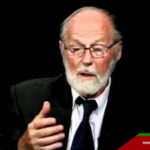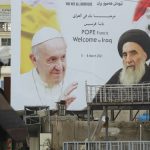Dr. Christopher Rollston
The Qur’an consists of 114 surahs (“chapters”). Every surah has a title (based on its content), but only one surah is named after a woman: the Virgin Mary. The technical name for that surah is “Surat Maryam” (surah 19). The fact that a surah is named after the Virgin Mary is stunning. After all, there is no surah named after Muhammad’s mother, Aminah. There is no surah named after Muhammad’s famed wife Khadijah. There is no surah named after one of Muhammad’s daughters, not even the beloved Fatima. But there is a surah named after the mother of Jesus of Nazareth. That is, the Holy Book of Islam gives significant primacy of place to a Jewish woman who was the mother of the central figure of Christianity. Certainly, the great Yale historian Jaroslav Pelikan (1923-2006) was quite correct in referring to the Virgin Mary as a “bridge builder,” a vital point of connection between Judaism, Christianity, and Islam.
Let’s begin with the nativity in the canonical Gospels. Within the New Testament, the only birth-narratives about Jesus are those of the Gospels of Matthew and Luke (namely, Matt 1:18-2:12; Luke 1:5-2:20, with Luke also providing narrative material about the birth of John the Baptist). Neither the Gospel of Mark nor the Gospel of John has a birth-narrative. In any case, within Matthew, there is reference to an angel “appearing to Joseph in a dream” (Matt. 1:20) after the conception, but prior to the birth. Matthew does not refer to an angel appearing to Mary. Conversely, Luke refers to an angel (Gabriel) appearing to Mary (Greek: Maryam), greeting her (and “startling her”), and then proclaiming to her that she had been chosen to give birth to Jesus. To this Mary responds: “How can this be, since I am a virgin?” Gabriel answers: “…the power of the Almighty will overshadow you.” Mary then says: “Here I am, the servant of the Lord, may it be with me according to your word” (Luke 1:34-37). Luke does not refer to an angel appearing to Joseph. Subsequently, Luke refers to angels proclaiming to the “shepherds” “who were guarding their flocks by night” (Luke 2:8) that they would find the baby Jesus “wrapped in strips of cloth and lying in a manger” (Luke 2:12). But Luke never refers to “wise men,” who were “following a star,” or to anyone bringing “gifts of gold and frankincense, and myrrh.” Conversely, Matthew’s account refers to “wise men,” “a star,” “gifts of gold, frankincense, and myrrh,” and a “house” where Jesus was (Matt 2:1, 10-11), but not to “shepherds,” “strips of cloth,” or a “manger.” Significantly, the birth-narratives of Matthew and Luke understand Mary and her husband Joseph to be observant Jews. In fact, Luke even mentions that Jesus was circumcised and named on the eighth day, and then at the time of Mary’s purification, they brought Jesus to the Jerusalem Temple and offered a sacrifice according to the Law of Moses (Luke 2:21-24; Lev 12:3-8). Also interesting is the fact that although both Matthew and Luke refer to the virgin birth, it is not mentioned in any of the remaining 25 books of the Greek New Testament. Paul, for example, refers to Jesus simply as “born of a woman, born under the law” (Galatians 4:4).
Now let’s look at certain aspects of the birth-narratives about Jesus in the Qur’an. For example, there is reference to an “angel” appearing before Mary in order to announce that she had been chosen to give birth to a “pure son.” She responds by saying, “How shall I have a son, since no man has touched me and I am not unchaste.” The angel answered and said “The Lord has said: ‘This is easy for me and we will appoint him as a sign unto (all) people.’” The Qur’an then declares “So she conceived him” (surah 19:19-22). Although Surat Maryam is an important birth-narrative, it is not the only birth-narrative in the Qur’an. Thus, Surat al-Imran (surah 3) has the following angelic announcement: “O, Mary, God has chosen you and purified you—chosen you above the women of all nations” (surah 3:42) and “O Mary, God gives you glad tidings of a word from Him: his name will be Christ Jesus” (surah 3:45). Ultimately, therefore, the Qur’an shares with the New Testament the belief that Jesus was born of a virgin and also the belief that he was Christ.
As an ancillary note, it is of some consequence that Surat Maryam begins with a beautiful narrative about the birth of John the Baptist (“Yahya” in the Qur’an), replete with reference to the aged Zachariah being told that he and his barren wife would have a son (surah 19:5-7), much the same as it is stated in the Gospel of Luke (1:5-17). Striking also is the fact that in the Qur’an, after being told that he and his wife will have a son, Zachariah requests proof: “How shall I have a son, when my wife is barren and I have grown quite feeble from old age?” (surah 19:8). This is very similar, of course, to Zechariah’s request for proof in Luke: “How can I know this? For I am an old man and my wife is well along in her days?” (Luke 1:18).
To be sure, there are differences between the narratives about the birth and nativity of Jesus in Matthew and Luke on the one hand and the narratives about the birth and nativity of Jesus in the Qur’an on the other hand. For example, Surat al-Imran mentions that Zechariah observed Mary’s reliance upon God (even prior to her pregnancy) and this prompted him to pray to God for a son, that is, John the Baptist (surah 3:37-38). And Surat Maryam states that Mary gave birth under a remote “palm tree” (surah 19:23), a story reminiscent of Hagar’s flights in Genesis 16 and 21 and the story of the birth of Jesus in the Gospel of Pseudo-Matthew 20. Furthermore, Surat Maryam emphasizes that Jesus was a “servant of God” (surah 19:30), not a “son of God” (surah 19:34-35). In short, there are differences between the Qur’an and Gospel accounts (but as noted there are also differences between the birth-narratives in the Gospels). In any case, the differences are all quite interesting and deserve discussion: civil and intelligent discussion. But, at the end of the day, it also seems useful to celebrate the shared traditions that are present. And the Qur’anic affirmation that Jesus of Nazareth was “born of a virgin” and was “Christ” seems to me to be something that constitutes an important shared tradition, one which constitutes a bridge between Islam and Christianity. And the fact that the maternal figure in the birth-narrative was an observant Jewish woman bridges all three Abrahamic religions in a marvelous manner. Jaroslav Pelikan was right.
A final word. Public discourse about religion sometimes focuses on dogmatic differences and doctrinal disputes between the three Abrahamic religions. This sort of discourse can rapidly become particularly harsh, polarizing, hypercritical, and it can devolve into mischaracterization and caricaturing. Indeed, for many centuries, and across the globe, all the world’s religions have on occasion been guilty of such things. That is, strife between religions is certainly not confined to the Abrahamic religions, but rather it is quite pervasive across the board. But polemical approaches to the subject of religion are corrosive and destructive. It seems to me that civil dialogue is a much preferable course of action. And focusing anew on shared religious traditions, rather than religious differences, can produce peace and understanding, something that is a desideratum for our fractured modern world, and a bridge to a better tomorrow for all humanity.








